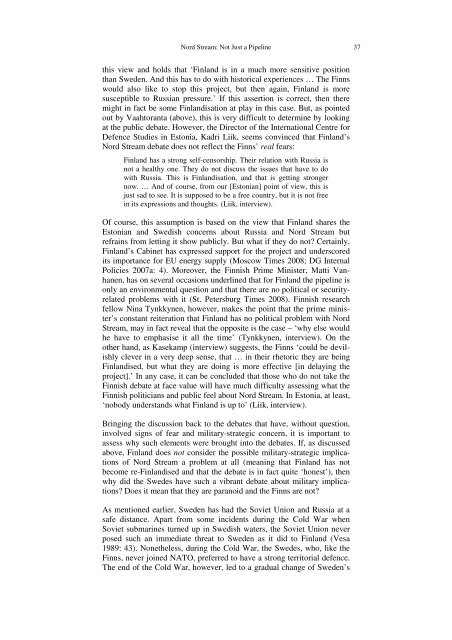Nord Stream: Not Just a Pipeline
Nord Stream: Not Just a Pipeline
Nord Stream: Not Just a Pipeline
You also want an ePaper? Increase the reach of your titles
YUMPU automatically turns print PDFs into web optimized ePapers that Google loves.
<strong>Nord</strong> <strong>Stream</strong>: <strong>Not</strong> <strong>Just</strong> a <strong>Pipeline</strong> 37<br />
this view and holds that ‘Finland is in a much more sensitive position<br />
than Sweden. And this has to do with historical experiences … The Finns<br />
would also like to stop this project, but then again, Finland is more<br />
susceptible to Russian pressure.’ If this assertion is correct, then there<br />
might in fact be some Finlandisation at play in this case. But, as pointed<br />
out by Vaahtoranta (above), this is very difficult to determine by looking<br />
at the public debate. However, the Director of the International Centre for<br />
Defence Studies in Estonia, Kadri Liik, seems convinced that Finland’s<br />
<strong>Nord</strong> <strong>Stream</strong> debate does not reflect the Finns’ real fears:<br />
Finland has a strong self-censorship. Their relation with Russia is<br />
not a healthy one. They do not discuss the issues that have to do<br />
with Russia. This is Finlandisation, and that is getting stronger<br />
now. … And of course, from our [Estonian] point of view, this is<br />
just sad to see. It is supposed to be a free country, but it is not free<br />
in its expressions and thoughts. (Liik, interview).<br />
Of course, this assumption is based on the view that Finland shares the<br />
Estonian and Swedish concerns about Russia and <strong>Nord</strong> <strong>Stream</strong> but<br />
refrains from letting it show publicly. But what if they do not? Certainly,<br />
Finland’s Cabinet has expressed support for the project and underscored<br />
its importance for EU energy supply (Moscow Times 2008; DG Internal<br />
Policies 2007a: 4). Moreover, the Finnish Prime Minister, Matti Vanhanen,<br />
has on several occasions underlined that for Finland the pipeline is<br />
only an environmental question and that there are no political or securityrelated<br />
problems with it (St. Petersburg Times 2008). Finnish research<br />
fellow Nina Tynkkynen, however, makes the point that the prime minister’s<br />
constant reiteration that Finland has no political problem with <strong>Nord</strong><br />
<strong>Stream</strong>, may in fact reveal that the opposite is the case – ‘why else would<br />
he have to emphasise it all the time’ (Tynkkynen, interview). On the<br />
other hand, as Kasekamp (interview) suggests, the Finns ‘could be devilishly<br />
clever in a very deep sense, that … in their rhetoric they are being<br />
Finlandised, but what they are doing is more effective [in delaying the<br />
project].’ In any case, it can be concluded that those who do not take the<br />
Finnish debate at face value will have much difficulty assessing what the<br />
Finnish politicians and public feel about <strong>Nord</strong> <strong>Stream</strong>. In Estonia, at least,<br />
‘nobody understands what Finland is up to’ (Liik, interview).<br />
Bringing the discussion back to the debates that have, without question,<br />
involved signs of fear and military-strategic concern, it is important to<br />
assess why such elements were brought into the debates. If, as discussed<br />
above, Finland does not consider the possible military-strategic implications<br />
of <strong>Nord</strong> <strong>Stream</strong> a problem at all (meaning that Finland has not<br />
become re-Finlandised and that the debate is in fact quite ‘honest’), then<br />
why did the Swedes have such a vibrant debate about military implications?<br />
Does it mean that they are paranoid and the Finns are not?<br />
As mentioned earlier, Sweden has had the Soviet Union and Russia at a<br />
safe distance. Apart from some incidents during the Cold War when<br />
Soviet submarines turned up in Swedish waters, the Soviet Union never<br />
posed such an immediate threat to Sweden as it did to Finland (Vesa<br />
1989: 43). Nonetheless, during the Cold War, the Swedes, who, like the<br />
Finns, never joined NATO, preferred to have a strong territorial defence.<br />
The end of the Cold War, however, led to a gradual change of Sweden’s













